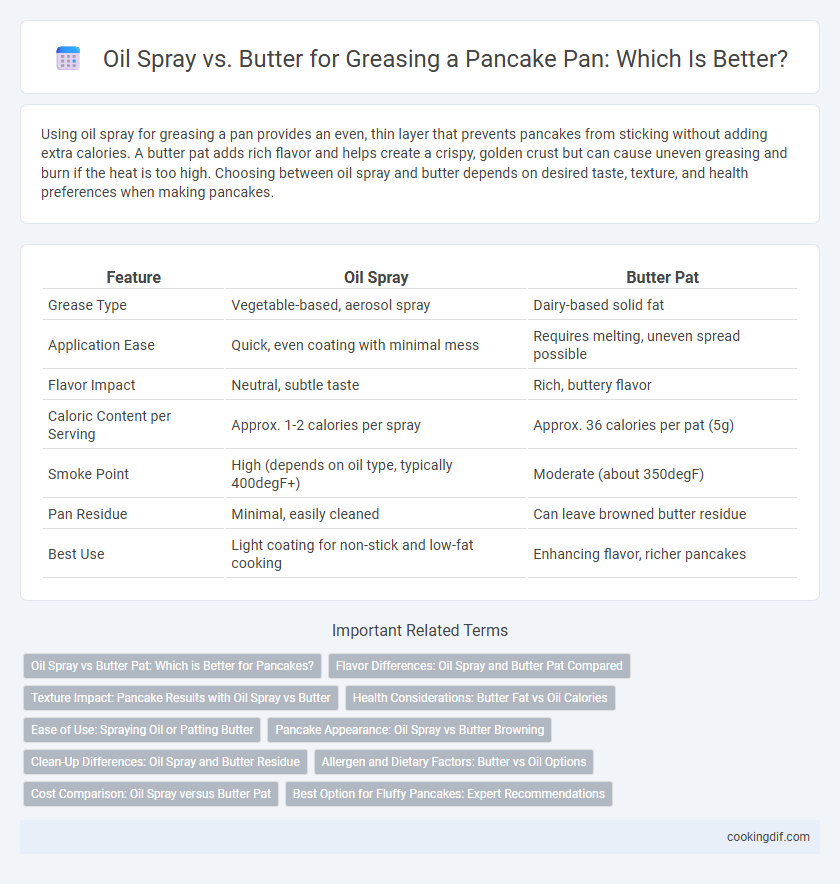Using oil spray for greasing a pan provides an even, thin layer that prevents pancakes from sticking without adding extra calories. A butter pat adds rich flavor and helps create a crispy, golden crust but can cause uneven greasing and burn if the heat is too high. Choosing between oil spray and butter depends on desired taste, texture, and health preferences when making pancakes.
Table of Comparison
| Feature | Oil Spray | Butter Pat |
|---|---|---|
| Grease Type | Vegetable-based, aerosol spray | Dairy-based solid fat |
| Application Ease | Quick, even coating with minimal mess | Requires melting, uneven spread possible |
| Flavor Impact | Neutral, subtle taste | Rich, buttery flavor |
| Caloric Content per Serving | Approx. 1-2 calories per spray | Approx. 36 calories per pat (5g) |
| Smoke Point | High (depends on oil type, typically 400degF+) | Moderate (about 350degF) |
| Pan Residue | Minimal, easily cleaned | Can leave browned butter residue |
| Best Use | Light coating for non-stick and low-fat cooking | Enhancing flavor, richer pancakes |
Oil Spray vs Butter Pat: Which is Better for Pancakes?
Choosing between oil spray and a butter pat for greasing a pan depends on the desired texture and flavor of pancakes. Oil sprays offer a thin, even coating that prevents sticking without altering taste, making them ideal for lighter, fluffier pancakes. Butter pats provide a richer, golden-brown crust and add a savory flavor, enhancing the pancake's taste but may result in uneven greasing and slight burning if not monitored.
Flavor Differences: Oil Spray and Butter Pat Compared
Oil spray provides a neutral flavor that allows the natural taste of pancakes to shine through, making it ideal for those who prefer a lighter, less buttery profile. Butter pats add a rich, creamy flavor that enhances the pancake's taste with a golden, slightly crispy edge due to the milk solids caramelizing during cooking. Choosing between oil spray and butter pat depends on whether the desired outcome is a subtle, clean flavor or a more indulgent, buttery finish.
Texture Impact: Pancake Results with Oil Spray vs Butter
Oil spray creates a thin, even layer that prevents pancakes from sticking while maintaining a light, fluffy texture. Butter pats add a richer flavor and can result in slightly crisper edges due to browning, but may cause uneven grease distribution. Choosing oil spray enhances consistent texture, while butter imparts taste and a golden crust.
Health Considerations: Butter Fat vs Oil Calories
Using oil spray to grease pancakes reduces added fat and calories compared to a butter pat, which contains saturated fats that can impact heart health. Butter provides flavor but typically adds around 100 calories and 7 grams of fat per tablespoon, whereas oil sprays deliver minimal calories due to their thin, even coverage. Opting for oil sprays, especially those made from heart-healthy oils like olive or avocado, supports lower calorie intake and improved cholesterol levels.
Ease of Use: Spraying Oil or Patting Butter
Oil spray offers a more consistent and even coating, reducing the risk of uneven greasing and sticking when cooking pancakes. Using a butter pat requires manual spreading, which can lead to clumps or uneven melting, potentially affecting pancake texture. For quick and efficient pan preparation, oil spray provides superior ease of use and time-saving benefits.
Pancake Appearance: Oil Spray vs Butter Browning
Oil spray creates a thin, even coating that minimizes browning and results in pancakes with a lighter, uniform appearance. Butter pats melt unevenly and cause localized browning, giving pancakes a richer golden color with slightly crisp edges. Choosing oil spray preserves a smooth surface ideal for stacked presentation, while butter enhances flavor with a visually appealing caramelized finish.
Clean-Up Differences: Oil Spray and Butter Residue
Oil spray creates a thin, even coating on the pan, leaving minimal residue and making clean-up faster and easier compared to butter. Butter pats often melt unevenly, leaving greasy spots and burnt residue that require more scrubbing. Using oil spray reduces the risk of stuck pancakes and simplifies washing by preventing oily buildup.
Allergen and Dietary Factors: Butter vs Oil Options
Oil spray offers a dairy-free alternative for greasing pans, making it suitable for individuals with lactose intolerance or milk allergies. Butter contains milk proteins and lactose, which can trigger allergic reactions or digestive discomfort in sensitive individuals. Choosing oil spray ensures a vegan and allergen-friendly option, while butter provides flavor but necessitates caution for those with dietary restrictions.
Cost Comparison: Oil Spray versus Butter Pat
Using oil spray for greasing pans is generally more cost-effective than butter pats due to its longer shelf life and precise application, minimizing waste. Butter pats tend to be more expensive per use, as they melt unevenly and often result in excess butter usage. Economical cooking favors oil spray for consistent, budget-friendly preparation of pancakes without compromising flavor or texture.
Best Option for Fluffy Pancakes: Expert Recommendations
Using an oil spray for greasing the pan ensures an even, thin coating that prevents pancakes from sticking while maintaining moisture, resulting in fluffy textures preferred by chefs. Butter pats add rich flavor and promote browning but can cause uneven cooking due to melting inconsistencies and occasional burning. Experts recommend oil spray as the best option for consistently fluffy pancakes without compromising flavor or texture.
Oil spray vs butter pat for greasing pan Infographic

 cookingdif.com
cookingdif.com